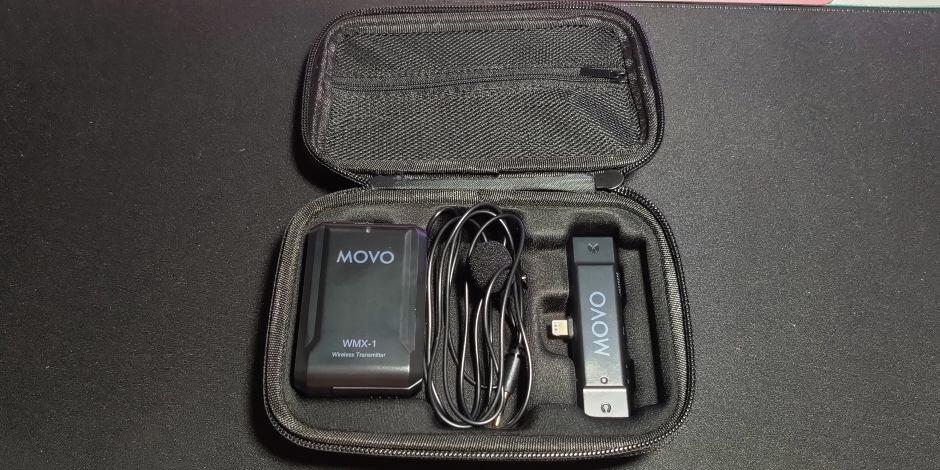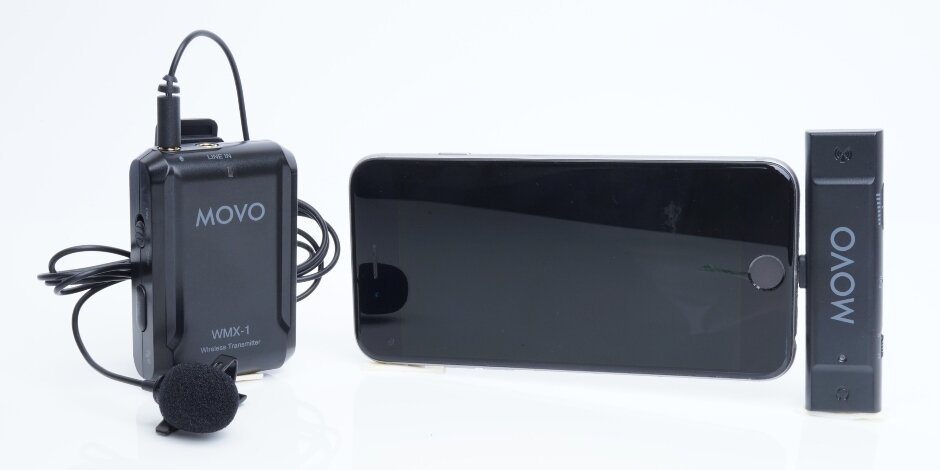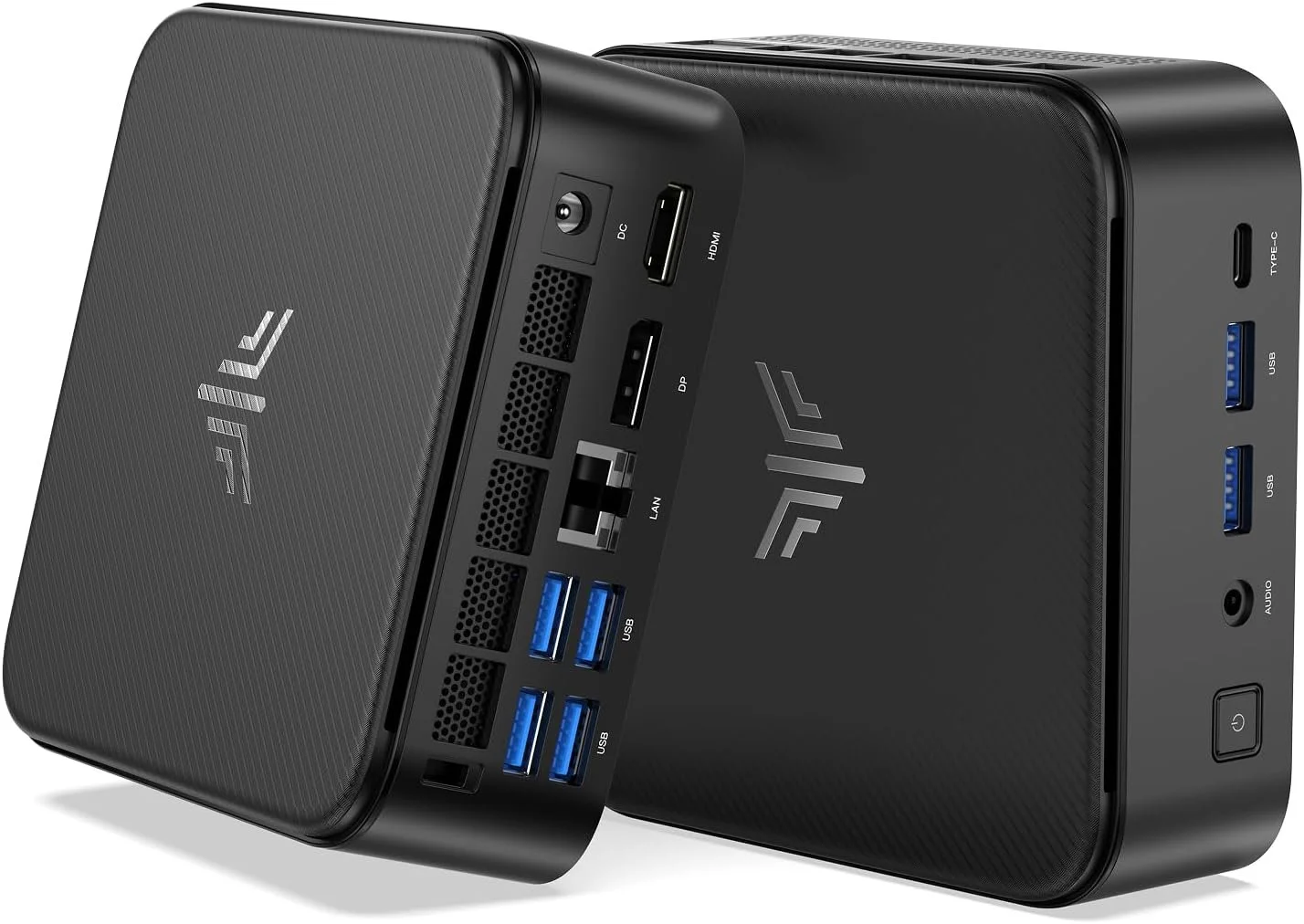Review sample provided by Movo
When I had originally seen Movo’s EDGE-DI Wireless Lavalier Microphone, I was instantly intrigued by what it was trying to achieve. The idea that it could be so easy to set up a wireless lavalier mic to connect directly to a phone was something big. Other companies have tried their hand at this but Movo figured out a way to make it extremely simple with less bulk to carry around. After getting a chance to play with the EDGE-DI, I’m extremely excited about how this company is showing an evolution in their audio equipment.
What’s In The Box
Opening the box was a real treat. The items inside include the WMX-1 Wireless Transmitter, the Edge-RXD, a mic, pop filter, mic clip, pairing pin, and carrying case. One of my favorite parts of the experience of opening everything is the fact that the case perfectly fits everything included inside of it. Having a case at all for this setup is awesome but knowing that everything inside is truly safe due to the molds of the shape of each part just adds a little extra. Besides that, you get a handy little instruction book that does a good job of explaining how to get started and troubleshoot issues that may arise.
Aesthetics and Build Quality
When talking about the actual designs used and how they actually fare when in use, it’s an extremely slick design all the way around. The transmitter and mic both have their own clips that attach to you and don’t really get in the way due to their smaller statures. The EDGE-RXD is where everything really shines through. It’s such a unique and expertly executed design choice. Being able to plug it directly into your phone and have its controls ready immediately just makes it all the more exciting to use. Movo seems to be the only company that has achieved a mobile or on-the-go wireless mic set that embraces the ease needed to bust everything out quickly to have it ready to go.
While the majority of the EDGE-DI is constructed out of plastic, it’s actually pretty sturdy. Buttons are extremely clicky and responsive on both devices included. At first, I thought it was going to feel cheap but I was pleasantly surprised to see just how solid it really is. I couldn’t really see them using too many metals anyway as they would then have the potential to damage whatever you’re attaching them to if handled incorrectly.
Getting everything set up is as I said, extremely easy. All you have to do is connect the mic to the receiver, turn it on, and then plug the RXD into your phone/tablet. There’s a light on both the transmitter and the EDGE-RXD that indicate when they are paired. The transmitter will blink blue both while it is on and while paired whereas the RXD will only light up with its steady blue light while paired. The pairing happens only when your phone is using either a video or audio recording app. From there, you’re ready to go start recording. It’s really that easy.
Specs and Audio Quality
Specifications of the EDGE-DI:
RF Modulation: GFSK
Polar Pattern: Omnidirectional
Frequency Band: 2.4 GHz
Frequency Response: 35Hz-14KHz+/-3dB
Signal/Noise: 84dB or more
Distortion: 0.05% or less
RF Output Level: 3mW
Reception Sensitivity: -90dB +/- 3dB / 0dB+1V/Pa, 1kHz
Audio Input Connector: 3.5mm mini-jack
Receiver Output Connector: Lightning jack
Range: 60m (197 ft)
When it came time to actually use these devices I was excited to see how they came together and what the finished product was. I did some testing using both the mono and stereo settings located on the RXD via a switch as well as comparing them to regular phone audio. I’m really thrilled with just how great this thing sounds no matter which setting you choose. Either one sounded so much more clear and crisp than my iPhone’s weak mic. Background noise was severely reduced as well.
One of my favorite features is the addition of the headphone jack on the RXD. It makes it fantastic to be able to monitor what’s going on from the other side and get a sense of the mic’s clarity. Another benefit is the volume control function located on the RXD which allows you to adjust what’s being picked up while in the middle of a recording. I’m just really surprised that everything that you’d need to have for a professional audio setup was done so right for a mobile approach. Most mobile gadgets come off as cheap or gimmicky but this thing is the real deal.
The EDGE-DI is advertised to be able to get up to 200 feet of a connection but I tested this indoors to keep safe given the pandemic. I was able to get a couple of rooms away with only some loss of audio every so often. I really can’t complain though. My house has a lot of materials that cause interference and I was decently far away at the point that audio was lost anyway. I’m sure that if this was used outdoors or even in a large convention setting that you’d be able to go further with it but honestly, 200 feet is a really far distance anyway.
What It Could Have Done Better
My single complaint is that the transmitter uses AAA batteries as opposed to a single rechargeable one. I’d be happy with even a micro-USB to charge it but alas, it uses AAAs. The RXD powers itself through your phone luckily, so that is one item removed from the equation. It hurts seeing technology still using regular batteries these days when there are other options available.
Verdict
As a lover of technology and the evolution of recording equipment, I’m more than satisfied with the EDGE-DI and what it offers. There are so many smart design choices put on display here that make some of the competition look outdated in their approach. It’s sleek, it’s easy to use, and it sounds absolutely fantastic. If you’re someone who needs audio to do recording on the go, this has to be in your tech bag. Movo really knows how to nail it.
























